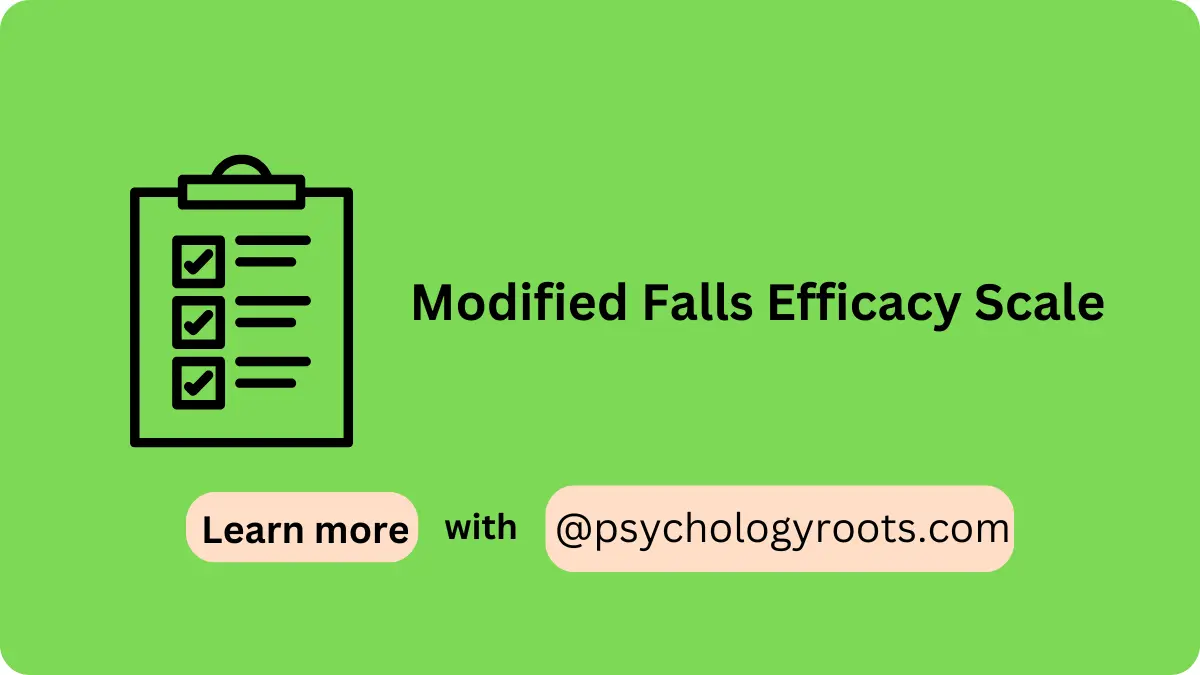Table of Contents
Modified Falls Efficacy Scale
Here in this post, we are sharing the “Modified Falls Efficacy Scale”. You can read psychometric and Author information. We have thousands of Scales and questionnaires in our collection (See Scales and Questionnaires). You can demand us any scale and questionnaires related to psychology through our community, and we will provide you with a short time. Keep visiting Psychology Roots.
About Modified Falls Efficacy Scale
Scale Name
Modified Falls Efficacy Scale
Author Details
Hill, K. D., Schwarz, J. A., Kalogeropolous, A. J., and Gibson, S. J.
Translation Availability
English

Background/Description
The Modified Falls Efficacy Scale (MFES) is a revised version of the original Falls Efficacy Scale, designed to assess an individual’s confidence in performing various daily activities without falling. This tool is particularly useful in evaluating the fear of falling in older adults and individuals with mobility challenges. It incorporates a broader range of activities compared to the original scale, making it more comprehensive.
The MFES is widely used in clinical and research settings to identify fear-related mobility limitations and to plan interventions to enhance balance confidence and functional independence.
Administration, Scoring and Interpretation
- Target Population:
- Older adults or individuals at risk of falls.
- Preparation:
- Ensure a quiet environment for administration and provide clear instructions to the participants.
- Procedure:
- Explain the purpose of the scale and assure confidentiality of responses.
- Ask participants to rate their confidence in performing each listed activity on a numerical scale.
- Clarify that the ratings should reflect their current level of confidence.
Reliability and Validity
- Reliability: The MFES has demonstrated excellent internal consistency, with Cronbach’s alpha values reported as high as 0.95.
- Validity: Validated against other measures of falls efficacy and mobility assessments, ensuring robust psychometric properties.
Available Versions
14-Items
Reference
Hill, K. D., Schwarz, J. A., Kalogeropoulos, A. J., & Gibson, S. J. (1996). Fear of falling revisited. Archives of physical medicine and rehabilitation, 77(10), 1025-1029.
Important Link
Scale File:
Frequently Asked Questions
Q1: What is the purpose of the Modified Falls Efficacy Scale?
The MFES measures confidence in performing daily activities without falling, particularly in older adults or those at risk of falls.
Q2: How many items are included in the MFES?
The MFES typically includes 14 items covering a range of daily activities.
Q3: Can the MFES be self-administered?
Yes, it can be self-administered or administered by a clinician if assistance is needed.
Q4: Is it necessary to adjust the scale for different populations?
Cultural and environmental factors should be considered when using the scale in diverse populations.
Q5: What interventions can be planned based on MFES results?
Results can guide fall prevention programs, physical therapy, balance training, and confidence-building activities.
Disclaimer
Please note that Psychology Roots does not have the right to grant permission for the use of any psychological scales or assessments listed on its website. To use any scale or assessment, you must obtain permission directly from the author or translator of the tool. Psychology Roots provides information about various tools and their administration procedures, but it is your responsibility to obtain proper permissions before using any scale or assessment. If you need further information about an author’s contact details, please submit a query to the Psychology Roots team.
Help Us Improve This Article
Have you discovered an inaccuracy? We put out great effort to give accurate and scientifically trustworthy information to our readers. Please notify us if you discover any typographical or grammatical errors.
Make a comment. We acknowledge and appreciate your efforts.
Share With Us
If you have any scale or any material related to psychology kindly share it with us at psychologyroots@gmail.com. We help others on behalf of you.